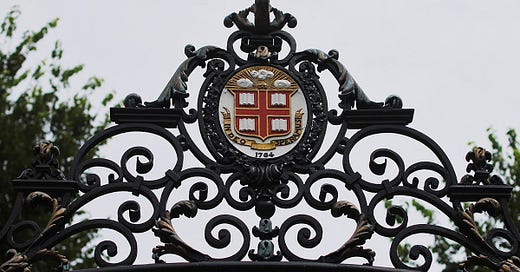A Response to Brown University's Plea for Continued Federal Entitlement
Interrogating the university's posture of institutional entitlement, bureaucratic self-regard, and selective moral indignation it so vividly—and unwittingly—puts on display.
The following is my letter, written as an alumnus of Brown University, to President Christina Paxson, in response to her recent communiqué entitled “Advocating for Brown—What’s at Stake,” in which she laments the potential loss of federal research funding and exhorts alumni to rally behind the University’s cause with pocketbook and cage-rattling. My response seeks to interrogate not merely the contents of her letter, but the broader posture of institutional entitlement, bureaucratic self-regard, and selective moral indignation it so vividly—and unwittingly—puts on display.
Dear President Paxson,
What follows may strike you as a bit florid, but what else could possibly match the pitch of your ceremonial dirge—sung from within the perfumed folds of Brown’s endowment-swaddled sanctum—a plaintive aria lifted toward that most dependable patron: the federal trough?
I write to you as an alumnus of this institution who, with a modicum of irony and a reservoir of disenchantment, nonetheless retains affection for the place where I first learned to distrust power when it arrives dressed in moral sanctimony. What you have sent out under the golden name of Brown is not a rallying cry, not even a defense of inquiry or truth, but rather a thinly veiled, self-pitying communiqué from one of the wealthiest academic establishments in the country, an institution so engorged with resources, so marbled in privilege, it cannot so much as imagine austerity without fainting into the outstretched arms of its PR department.
You tell us, with all the heaving gravitas of a ship captain before a squall, that Brown—our dear, weathered Ark of Inquiry—is under threat. That we must reconfigure, must brace, must gird against the dire consequences of federal fiscal cold-shouldering. And then, with tremulous voice (carefully modulated to suggest vulnerability without panic), you offer the solution: send money, write letters, agitate gently on behalf of the cause. The cause, in this case, is the continued siphoning of taxpayer dollars into a university that has, as of 2025, an endowment north of $6.6 billion.
Billion.
With a B. Let that syllable echo around a moment.This is not the starving library of Alexandria aflame in the night. This is Versailles under threat of slightly delayed champagne shipments.
How convenient that Brown now must pose as the beleaguered underdog, the defiant voice of liberty and enlightenment, even as it polices language on campus with the bureaucratic fervor of a Soviet satellite and curates its research to align with whatever ideological winds blow strongest through the Office of DEI & Compliance. Is this the academic freedom now in jeopardy? The freedom to publish unreadable white papers on identity hegemony in 18th-century nautical charts while collecting NIH grants and congratulating oneself for bravery?
Even more perverse is the way your letter toggles, with the smooth dexterity of a practiced rhetorician, between appeals to scientific nobility and institutional self-preservation. One paragraph champions research into RNA and dementia, the next quietly slips in a nod to Brown’s lawsuits, lest we forget that the university is also a plaintiff, a warrior for its own wallet.
What is especially galling is the feigned helplessness. “We’ve received no official notice,” you write—like a robber disappointed the bank hasn't yet confirmed the vault was emptied. As if the mere possibility of reduced funding were itself a form of oppression. As if a university, a true university, should not be prepared to pursue truth even without the guiding hand of federal subsidy.
What has happened here is not persecution. It is inconvenience. And Brown’s response—begging its alumni to become apostles of appropriations—is not noble. It is vulgar.
If the university is truly committed to research and scholarship, it can fund it. You can fund it. You can divest from bloated bureaucracies, from administrative redundancies, from the endless procession of vice provosts for feelings. You can liquidate a few assets, hold off on the next eco-friendly, spiritually aware student center. You can teach students to read, think, and argue with integrity—even, God forbid, without the imprimatur of NIH.
But you won’t. You’ll write another letter. And another. And each will ask for more.
In the end, what’s most tragic isn’t the looming budget cuts or the rhetorical sleight of hand. It’s that the university, once a sanctuary for difficult truths, now sends out cries for help that sound like corporate press releases, that reads like a cocktail of NPR sedative and Ivy League entitlement, shaken well, served over crushed credibility.
Sincerely,
Michael Rose, MFA 1995
Michael S. Rose, a leader in the classical education movement, is author of The Art of Being Human, Ugly As Sin and other books. His articles have appeared in dozens of publications including The Wall Street Journal, Epoch Times, New York Newsday, National Review, and The Dallas Morning News.






Excellent response.
It is difficult for me when my students get accepted to my Alma Mater (The University of Michigan).
I still hold affection for her, but she was on the leading edge of the destruction of our culture.
Thank you, I’m stunned again by your message and your method.